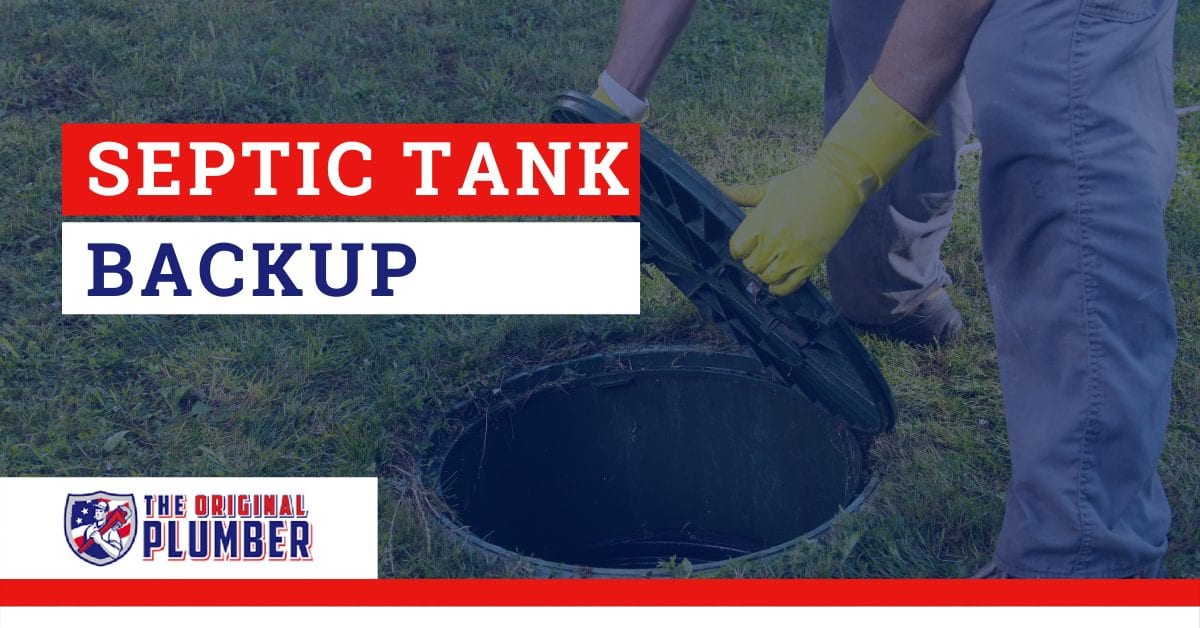A septic tank is a crucial part of your home’s plumbing system. It serves as a holding area for all the sewage that leaves your house, and it breaks down solids into liquid before releasing them into the ground. Your septic tank is buried underground, usually around ten feet away from your property, and made from plastic or concrete.
In a perfect world, the filtered wastewater makes its way into your home’s drain field (also known as a leach field). Impurities are removed by the gravel and soil in your drain field, and the water moves through it slowly over time.
However, a septic tank backup can happen if your drains get clogged up or experience other issues. This can bring the wastewater into your home! Here are some prevention tips and warning signs.
There are multiple reasons your septic tank could backup. Some of these issues are things you can completely control, but others are up to mother nature. Septic tanks are designed to last 20-40 years, but if not properly maintained they can fail much sooner.
Tree Roots Growing Into Your Pipes
If you have cracked pipes, tree roots can grow into them and obstruct the flow of water. Tree roots can grow pretty far from where the tree is planted. So if you have a crack in a drain line, the tree root can grow into it and then cause an obstruction. If your pipes are blocked by a tree root, you’ll need to have your line repaired or replaced, depending on how long the root is.
Garbage Disposal Issues
Food that is too large for the open sewer line can cause clogs and block the line. Make sure you don’t overflow your garbage disposal with food and make sure it is small enough to effectively be broken down by the garbage disposal.
Did you know that a septic tank backup is usually caused by improper disposal of human waste, grease, or fat? That being said, don’t pour grease down the drain. Even if you rinse your pans, hot cooking oil or grease can solidify once they cool. This can build up over time and create a blockage.
Foreign Objects Causing Clogs
Non-flushable solids can create a big septic tank problem. The only things that should flush down your toilet are waste and toilet paper! But luckily, a clogged drain is a fairly simple fix if you catch it early enough and there are no other issues.
If you want to confirm that your toilet paper is septic safe, you can do a quick test with a jar. Fill a jar with water and then add some squares of toilet paper. You should ideally try this with a few different brands of toilet paper in different jars to see which one dissolves the quickest. The faster it dissolves, the better! This means it’s less likely to build up in your tank and cause issues.
Water Overflow and Increased Usage
If you’re using a lot of water throughout your day – multiple loads of laundry, running the dishwasher, and multiple showers in a day – then it’s possible that you’re overwhelming your system.
If you have company coming to visit you, make sure you space out your water usage accordingly to prevent the system from overflowing. To know exactly how much water you can use without stressing the septic system, be sure to check your tank size.
Flooding After Heavy Rainfall
Heavy rains can overwhelm your system too! If there is extra rainy weather, it can oversaturate your soil. Wet soil means the potential for drainage issues, since the dry soil absorbs the liquid wastewater.
Dangers of Septic System Backups
If you have a septic system backup, it can eventually make its way into your house. This is especially true if you have a basement. Sewage backup can be a huge health hazard to you and your family.
The water in your septic tank is meant for human waste. Because of this, it is often contaminated with bacteria or viruses that can make you sick if ingested or can irritate your skin.
Plus, if a sewage backup makes its way into your basement, you run the risk of water damage or mold. If you suspect you have a pipe leak or clog, be sure to have a plumber inspect it before something seemingly small becomes a big deal.
How to Prevent Septic Tank Backups
The best way you can prevent septic tank backups is to have regular septic system maintenance. Be sure to have your septic tank pumped every three to five years. Septic tank pumping can prevent clogs. Plus, we can detect damage with routine maintenance.
There are also a few simple things you can do to stay proactive beyond having your system pumped. You can use a hair catcher in your showers and tubs to prevent excess waste from clogging your drain pipes. Plus, properly dispose of baby wipes, feminine hygiene products, paper products, and other foreign objects that shouldn’t be flushed down a toilet.
It’s also important to protect your drain field area. Your drain field is meant for the liquid to flow by using a special type of soil. Compacting that soil can prevent the water from flowing properly. Do not drive over your drain field or leave heavy machinery on top of it so the soil can stay in the best condition possible.
Warning Signs of a Septic Backup
There are a few different warning signs that you may have a septic or sewage backup. Keep an eye out for one or multiple of these issues.
- Clogged toilet or drains
- A bad smell coming from your yard
- A green patch with pooled water
- Standing water in your yard, especially near your septic tank lid
- Water backing up in your showers and sinks, especially if it is foul-smelling or dark-colored
If you’re noticing more than one of these signs at the same time, give The Original Plumber & Septic a call right away.
Call The Original Plumber & Septic
When your septic tank backs up, the best way to eliminate the issue is to call a plumber. Our professional team in Atlanta has the required tools and knowledge to safely handle septic systems. Let us handle your any sewage or septic problems so you can rest easy. The Original Plumber & Septic is available for 24/7 emergency septic repair services.





